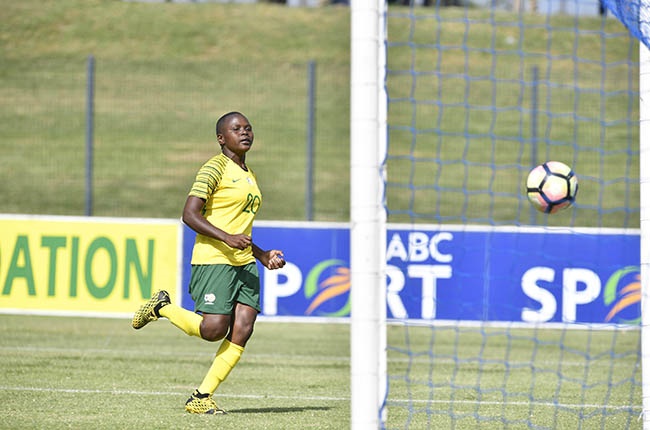
- Banyana star Rhoda Mulaudzi says she is blessed to have the fine trophy-winning run she's enjoyed since June.
- Mulaudzi won the SAFA National Women's League with Mamelodi Sundowns Ladies, and added the Belarus Women’s Cup on Monday and Safja Women’s Footballer of the Season award a day later.
- She says the awards and overseas success will help lure talented women to the sport, to show that there’s some reward for their hard-work, despite the SA amateur environment.
Life’s a beach for Banyana Banyana star Rhoda Mulaudzi at the moment.
The striker helped Dinamo BSU beat FC Minsk in the Belarus Women’s Cup final on penalties on Monday, playing with fellow South African Lebogang Ramalepe in the team.
A day later she won the first-ever South African Football Journalists’ Association (Safja) Women’s Footballer of the Season award, held virtually and organised and hosted by some of the country’s top media professionals.
It capped a whirlwind couple of months that saw her former team, Mamelodi Sundowns Ladies, being crowed the inaugural SAFA National Women’s League champions – doing so unbeaten, at that.
"It was an amazing moment to win the final," Mulaudzi told Safja journalists about her cup victory for Dinamo.
"Recently, in South Africa we were just crowned the National Women’s League champions. It means that I am a champion everywhere that I go, so I feel blessed.
"Looking back at [Monday] night’s game, it was not an easy game. It was a derby, so it was a tough game. But it was exciting and amazing to win it.
"I believe it was all down to teamwork and our team spirit. I’ve never won anything overseas, so it was the first time for me to lift a trophy here. I can’t even describe the amazing feeling I had."
The 30-year-old, who scored an eye-watering 36 goals for Sundowns Ladies in just 18 appearances, beat former African Women’s Footballer of the Year Noko Matlou as well as Andile Dlamini and Hilda Magaia to the R10 000, Hollywoodbets-sponsored Safja award.
Mulaudzi, who has also played for Canberra United in Australia’s W-League and in Cyprus last year, was part of Desiree Ellis’ Banyana team that made the FIFA Women’s World Cup for the first time in France in 2019.
She said being honoured with awards and her success overseas would help boost the profile and appeal of women’s football, which lagged some way behind the men’s game in almost all facets.
"All I can say is, to all the women out there playing football, it’s possible for any player to go play overseas and to shine." Mulaudzi said.
"It doesn’t matter which league you are playing in. Playing in South Africa is difficult because we don’t have a professional league as yet and it takes hard work.
"Most women playing in South Africa depend on the national team for some sort of salary, which I think is not enough [to sustain them].
"I believe this award is going to encourage a lot more players to work harder, so that they can find themselves being honoured with these kinds of awards.
"This award can build the player’s morale so that whenever they are thinking of going to play, they know that there is some sort of reward for players. It’s something that I see is going to grow and could attract more sponsors to women’s football."
It used to be that the Sasol League, established in 2009, was the only major competition in women’s football. However, last year SAFA introduced the National Women’s League, which was aimed at growing the game.
However, according to Mulaudzi, with neither of them being professional, women’s football remained hamstrung and vulnerable to talented players simply walking out and pursuing other career fields.
"It’s all about having sponsorship in the women’s game," she said.
"We can talk about how, when we get our overseas contracts, it’s going to boost the national team. And, yes, it might but what is it going to do for our local leagues?
"I don’t think it’s enough to only have the National League and the Sasol League. We need more and a professional league that will build players.
"In South Africa we have good players, talented players who are willing to play football but somewhere somehow they end up quitting the game. Because what’s the use of continuing to play when you’re not getting anything and there’s nothing encouraging you to continue playing football.
"If we start to have a professional league whereby playing can get something from it, it’s going to encourage women to play more."
